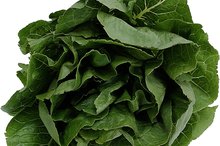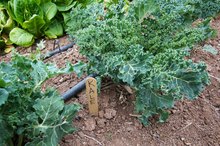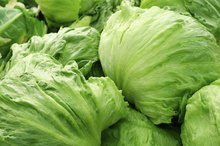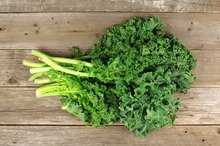What does fact checked mean?
At Healthfully, we strive to deliver objective content that is accurate and up-to-date. Our team periodically reviews articles in order to ensure content quality. The sources cited below consist of evidence from peer-reviewed journals, prominent medical organizations, academic associations, and government data.
- Office of Dietary Supplements: Vitamin A
- MedlinePlus: Vitamin K
- MedlinePlus: Iron
- Office of Dietary Supplements: Magnesium
The information contained on this site is for informational purposes only, and should not be used as a substitute for the advice of a professional health care provider. Please check with the appropriate physician regarding health questions and concerns. Although we strive to deliver accurate and up-to-date information, no guarantee to that effect is made.
Nutritional Information for Okra Leaves
Okra, a flowering plant that is native to Africa but can be grown in any warm environment, produces edible seed pods similar to pea pods. Okra and okra leaves are used in food to enhance flavor, due to their slightly bitter taste, but are also used for their potential health benefits. Okra leaves are a common ingredient in southern-style dishes such as gumbo and various soups, but can also be found in tea and in the form of a powdered extract sold as a nutritional supplement. If you consume okra leaves or okra leaf extract for health, talk to your doctor first to make sure it is right for you.
Fiber
While the okra seed pods contain high amounts of nutrients, including carbohydrates, protein, vitamins and minerals, the primary constituent of okra leaves is insoluble fiber. Insoluble fiber cannot be broken down and digested by your body. Instead, fiber helps promote gastrointestinal and digestive health as well as the normal passage of stool. Fiber also provides a positive environment in your colon and small intestine to allow beneficial bacteria to grow, which helps your body break down and absorb nutrients.
- While the okra seed pods contain high amounts of nutrients, including carbohydrates, protein, vitamins and minerals, the primary constituent of okra leaves is insoluble fiber.
- Fiber also provides a positive environment in your colon and small intestine to allow beneficial bacteria to grow, which helps your body break down and absorb nutrients.
Vitamins
The Difference in Nutrients Between Collard Greens and Spinach
Learn More
Okra leaves contain trace amounts of vitamins A and K. According to the Office of Dietary Supplements, or ODS, vitamin A is essential for bone growth, reproduction, cell division, eye health and immune system function 25. MedlinePlus, a website run by the National Library of Medicine, reports that vitamin K is essential to your body's ability to form blood clots in response to injury 34. Vitamin K is also necessary for bone strength, especially in older populations.
Minerals
Okra leaves contain trace amounts of minerals and phytonutrients such as iron and magnesium. Iron is important for the formation of proteins used to make blood cells and hemoglobin, the component of your red blood cells that carries oxygen. Magnesium is important for many enzymatic activities throughout the body and contributes to health of the immune system, the central nervous system and bones.
Recommendations
What Are the Benefits of Marshmallow Root & the Slippery Elm Herb?
Learn More
Although okra leaves don't contain very high amounts of vitamins and minerals, they can be used to provide extra fiber in your diet and enhance the flavor of foods and beverages. Too much okra can cause gastrointestinal distress and constipation, which is usually attributed to the high fiber content of okra leaves. If you suffer from intestinal disorders like diverticulitis or colon cancer, talk with your doctor about your daily fiber needs.
Related Articles
References
- "Today's Herbal Health: An Essential Reference Guide"; Louise Tenney; 2000
- Office of Dietary Supplements: Vitamin A
- MedlinePlus: Vitamin K
- MedlinePlus: Iron
- Office of Dietary Supplements: Magnesium
- Durazzo A, Lucarini M, Novellino E, Souto EB, Daliu P, Santini A. Abelmoschus esculentus (L.): Bioactive components' beneficial properties--focused on antidiabetic role--for sustainable health applications. Molecules. 2018;24(1):38. doi:10.3390/molecules24010038
- Okra, cooked, boiled, drained, without salt. FoodData Central. U.S. Department of Agriculture. Published April 1, 2019.
- Slavin J. Fiber and prebiotics: Mechanisms and health benefits. Nutrients. 2013;5(4):1417-1435. doi:10.3390/nu5041417
- Islam MT. Phytochemical information and pharmacological activities of Okra (Abelmoschus esculentus): A literature-based review. Phytother Res. 2019;33(1):72-80. doi:10.1002/ptr.6212
- Vitamin K: Fact Sheet for Health Professionals. National Institutes of Health Office of Dietary Supplements. Updated February 24, 2020.
- Kung SJ, Steenhoff AP, Gray C. Food allergy in Africa: myth or reality?. Clin Rev Allergy Immunol. 2014;46(3):241-9. doi:10.1007/s12016-012-8341-z
- Eating, Diet, and Nutrition for Kidney Stones. National Institute of Diabetes and Digestive and Kidney Diseases. Updated May 2017.
Writer Bio
Joe King began writing fitness and nutrition articles in 2001 for the "Journal of Hyperplasia Research" and Champion Nutrition. As a personal trainer, he has been helping clients reach their fitness goals for more than a decade. King holds a Bachelor of Science in kinesiology from California State University, Hayward, and a Master of Science in exercise physiology from California State University, East Bay.









